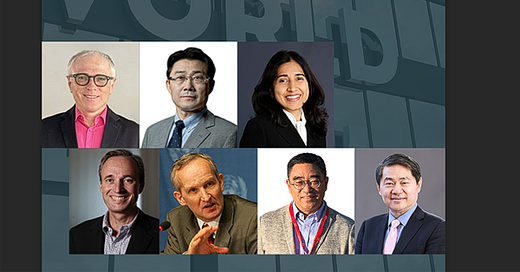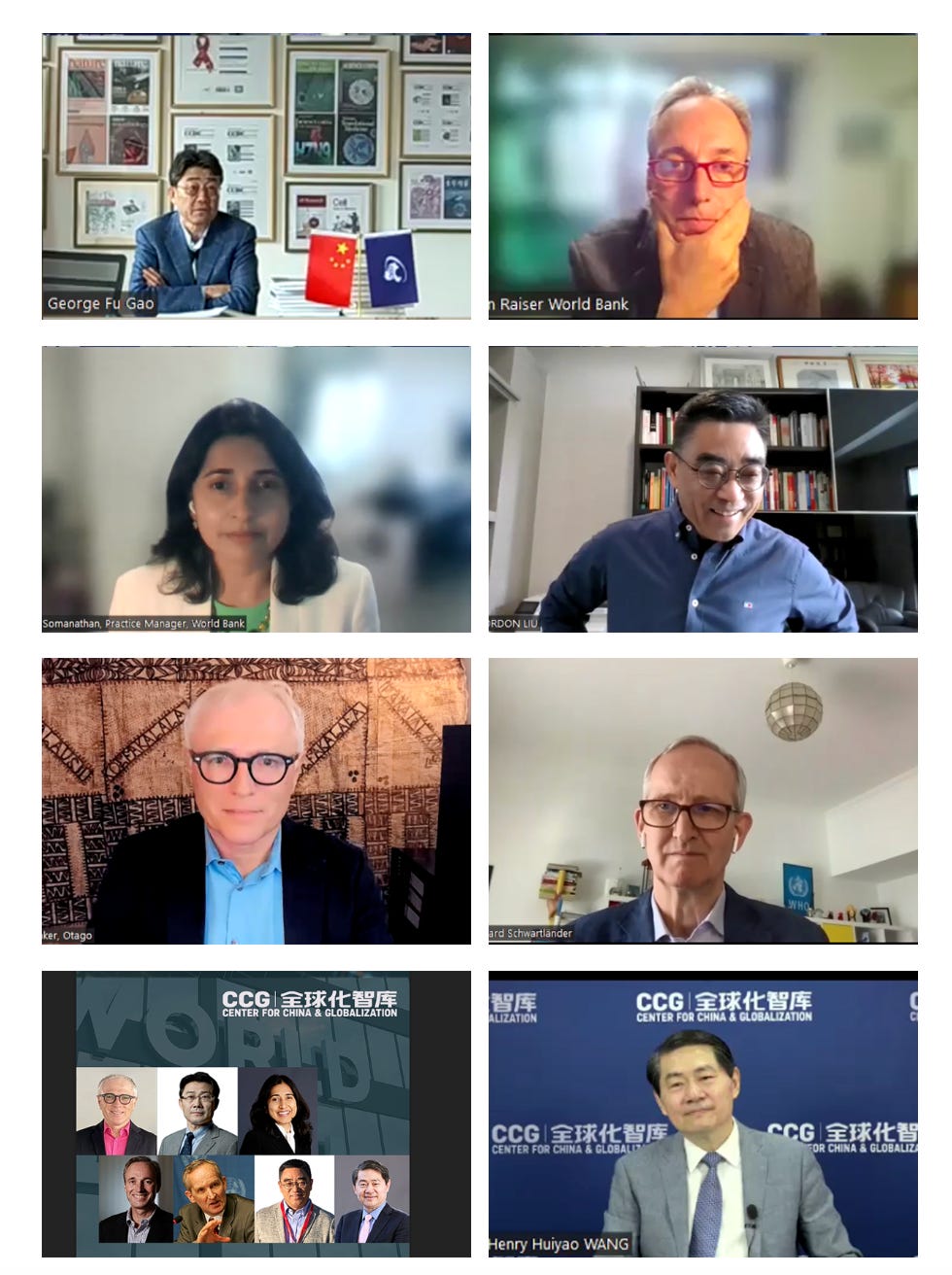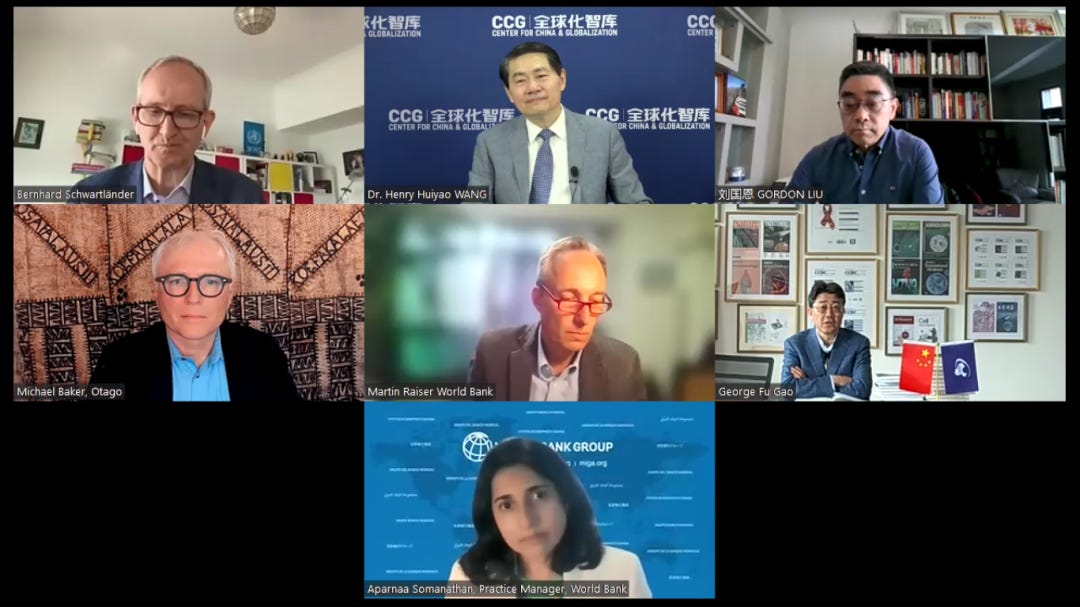CCG, in April, recommended Chinese Govt to shift COVID strategies upon Int'l consultation
Henry Huiyao Wang hosted Geroge Fu Gao, Gordon Liu, Bernhard Schwartländer, Martin Raiser, Aparnaa Somanathan, and Michael Baker in an online seminar and then submitted recommendations.
At the end of April 2022, when Shanghai was in lockdown, Beijing saw an outbreak, and many Chinese cities also reported a growing number of COVID infections, the Center for China and Globalization (CCG) recommended relevant departments of the Chinese government shift COVID strategies based on consultations with its network of experts, including an online seminar on April 29.
CCG’s recommendations
Judging from the spread speed and effect of Omicron at present, from the perspective of balancing the cost and effect of the anti-epidemic strategy, China's strategic guidelines for anti-epidemic efforts can gradually change from seeking "zero infection" to seeking zero or low mortality.
1)The investment in anti-epidemic infrastructure (such as building many fangcang hospitals/centralized quarantine facilities) may be turned into infrastructure treating severe cases of COVID,
such as intensive care units (ICUs). Medical resources should be prioritized for critically ill patients due to COVID, elderly patients, patients with underlying health conditions who need routine medical treatment, and patients with sudden and life-threatening acute diseases. The goal of the anti-epidemic efforts should be to reduce the mortality rate of serious diseases as the main, fully reflecting the humanitarian mission of China’s anti-epidemic measures.
2)The focus of community workers, neighborhood committees, and volunteers can shift from large-scale nucleic acid (PCR) testing and distributing goods to increasing the vaccination rate.
Through various incentives and soft constraints, encourage unvaccinated people (especially the elderly) to get vaccinated, and the people who have already received two vaccine shots should be encouraged to get the booster shots. These incentives may include mobilizing relevant people to vaccinate on the community level, improving the accessibility and convenience of vaccination, and implementing appropriate restrictions on unvaccinated people’s access to public places.
(3) “Flatten the curve” rather than excessively seek "zero infection.”
Optimize the current combination of various anti-epidemic policies and flexibly adopt various anti-epidemic measures. Promote normalization and unification of the anti-epidemic efforts, avoid the use of overly strict measures that have a great impact on the economy and life, and adopt unified national policies in the health code, travel pass, and “return-to-work” certificates, to prevent local governments from taking excessive steps respectively which resulted in various uncertainties and greatly reduced the effects of related pro-growth policies.
(4) Consider shortening the quarantine period to avoid unnecessary waste.
In view that the Omicron variant spreads easily, especially its short incubation period (less than 72 hours), consider shortening the quarantine period to avoid unnecessary waste. Recently, after the vaccination rate has greatly increased, the number of daily infections in Hong Kong has dropped to more than 100 cases, and the inbound quarantine requirement in Hong Kong has been shortened to 7 days. After the relevant conditions are met, the time of entry quarantine in the Chinese mainland can be shortened accordingly. Presently, the inbound quarantine for Beijing is 10+7 days which produces many inconveniences for travel.
(5) Approve qualified foreign vaccines.
Chinese vaccines have played a key role in the fight against the COVID-19 epidemic, and the effect is very good. However, international experts also suggest that foreign vaccines should be opened to foreigners in China as soon as possible, overseas Chinese who need frequent international contacts, and Chinese nationals who need to go abroad from China. International studies have shown that mixing vaccines of different types can maximize protection and reduce the rate of severe cases.
CCG’s analysis
At present, the negative impact of the COVID-19 epidemic on China's economy has become increasingly prominent. Shanghai's situation has led to disruptions in the national supply chain. Beijing’s new outbreak is also a new challenge. In this regard, whether it is necessary to stick to the “dynamic zero COVID” strategy has become a hot topic among all parties.
Judging from the current situation, although there have been many confirmed infections and asymptomatic cases inShanghai, the number of deaths caused by the epidemic has remained relatively low. Existing studies have shown that Omicron has a shorter duration of symptoms and a lower risk of hospitalization. After adequate vaccination, the mortality rate is lower than that of influenza. In Japan and Singapore, for example, the death toll from COVID-19 is only 0.009% of the population so far this year. In Vietnam, with relatively weaker conditions, the figure is only 0.011%. In the United States, after the impact of Omicron, new deaths from COVID-19 has gradually decreased, with the death toll in the last three months to 0.032% of the total population.
It can be deduced that if the vaccination rate in China can be increased to 90%, the death rate of the population caused by the COVID-19 epidemic will drop to one over ten thousand or less, and the death toll from the COVID-19 epidemic will be roughly the same as the death toll from influenza in China.
George Fu Gao, director of China's Centers for Disease Control and Prevention, also said in his speech [in the online meeting organized by CCG]: "Omicron is not that dangerous. Perhaps the virus has spread rapidly, but the rate of severe cases will decline." Some countries that have switched from "zero COVID" to "co-existence,” such as Singapore, have benefited from high vaccination rates and good allocation of medical resources, and the overall mortality rate is also low. Therefore, China has certain flexibility in optimizing the current anti-epidemic policy or adjusting the current "dynamic zero-COVID" strategy, but it needs to use the current opportunity to make adjustments as soon as possible.
CCG’s online seminar
On April 29, 2022, CCG held an online seminar attended by
Geroge Fu Gao, Director of China Center for Disease Control and Prevention and Academician of the Chinese Academy of Sciences;
Gordon Liu, Dean, Institute for Global Health and Development, Peking University and member of China National Expert Panel on Covid-19;
Bernhard Schwartländer, former Representative of the World Health Organization in China and Chef de Cabinet, Assistant Director General (and now global health envoy with the German Foreign Office)
Martin Raiser, then World Bank’s Country Director for China and Mongolia, and Director for Korea (and now VP for South Asia)
Aparnaa Somanathan, Practice Manager for Health, Nutrition and Population for East Asia and the Pacific at the World Bank.
Michael Baker, Professor of Public Health at the University of Otago, Wellington, New Zealand.
Henry Huiyao Wang, Founder and President of CCG, hosted the online seminar.
A Message From the Center for China and Globalization (CCG):
As probably the only Chinese mainland think tank which regularly delivers English-language newsletters, we are excited to share with you that we are expanding newsletter offerings on Substack.
Firstly, we are launching The East is Read, which offers frequent briefings on Chinese policies drawing mostly from Chinese mainland sources for all existing subscribers to CCG's traditional newsletter.
Secondly, we are moving CCG’s traditional newsletter to CCG Update, to keep you informed of the reports, events, analyses, commentaries, and other activities of CCG, including many high-impact Chinese mainland settings that aren’t very known internationally.
Substack enables instant unsubscribing within each and every email, so you can unsubscribe anytime with a single click.
Thirdly, we have recently brought into our portfolio Pekingnology, a two-year-old China newsletter. You are welcome to check it out.
As a leading non-governmental think tank in China, we intend, to the best of our abilities and compatible with our resources and limits, to contribute to the vibrant observation and discussions on China in English.
We know we can only retain your subscription with valuable content. With everyone's inboxes so full these days, that's an immense challenge few in the Chinese mainland have taken on. But we are ready.









